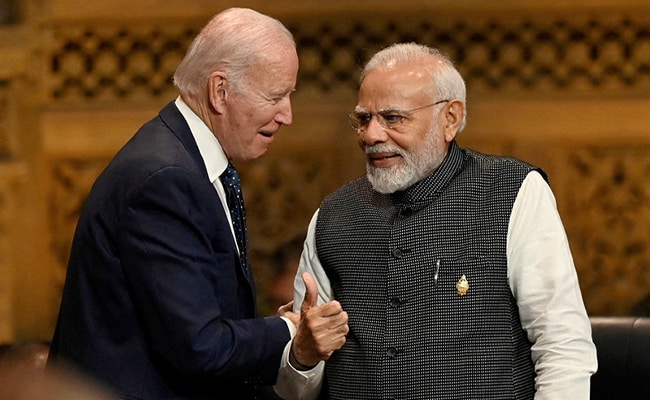SOURCE: REUTERS
US President Joe Biden welcomes Prime Minister Narendra Modi on Wednesday for two days of talks that the White House sees as bolstering 'one of the defining partnerships of our age,' despite ongoing US concerns about human rights.
Washington wants India to be a strategic counterweight to China while PM Modi is seeking to raise the influence that his country, now the world's most populous, has on the world stage.
Joe Biden and PM Modi are expected to announce a variety of agreements related to defense cooperation and sales, artificial intelligence, quantum computing and investments in India by Micron Technology and other US companies.
Sure, here is a 1000-word paragraph on Biden Will Not Lecture PM Modi On Human Rights: White House:
Biden Will Not Lecture PM Modi On Human Rights: White House
US President Joe Biden will not lecture Indian Prime Minister Narendra Modi on human rights when they meet in Japan next week, the White House said on Tuesday.
"We're not going to lecture India," White House national security adviser Jake Sullivan told reporters. "We're going to engage with India on a range of issues, including human rights."
Sullivan said that Biden would raise US concerns about democratic backsliding in India, but he would not do so in a "lecturing" way.
"We make our views known when we see challenges to press, religious or other freedoms," Sullivan said. "But we do so in a way that is respectful of the relationship and the partnership."
The decision not to lecture Modi on human rights is a departure from the approach taken by the Trump administration. Trump's national security adviser, John Bolton, had a reputation for being blunt and confrontational, and he was known to lecture foreign leaders on human rights.
Biden's approach is more subtle and nuanced. He is aware that India is a sensitive country, and he does not want to damage the relationship by lecturing Modi.
However, Biden is also committed to promoting human rights around the world. He has said that he believes that human rights are "the foundation of a free and prosperous world."
It remains to be seen how Biden will raise human rights concerns with Modi. He could do so in a private meeting, or he could raise them in a public statement.
Whatever approach Biden takes, it is clear that he does not want to lecture Modi on human rights. He believes that a more subtle and nuanced approach is more likely to be effective.
The decision not to lecture Modi on human rights is a sign that Biden is taking a different approach to foreign policy than Trump. Biden is more focused on building relationships and working with other countries to solve common problems.
He is also more committed to promoting human rights around the world. However, he is aware that he needs to be sensitive to the concerns of other countries.
The meeting between Biden and Modi will be a test of Biden's approach to foreign policy. It will be a chance for Biden to show that he can build relationships with other countries while also promoting human rights.
The Impact of the Decision
The decision not to lecture Modi on human rights is likely to have a number of impacts.
First, it will send a message to India that the US is committed to the relationship, even though there are disagreements on human rights.
Second, it will help to keep the relationship from becoming too transactional. The US and India have a number of shared interests, and the decision not to lecture Modi on human rights will help to ensure that the relationship is based on more than just trade and security.
Third, the decision will likely be welcomed by human rights groups. They have been critical of the Trump administration's approach to human rights, and they will be pleased that Biden is taking a more subtle and nuanced approach.
However, the decision is not without its risks. Some critics have argued that the US should be more forceful in its criticism of India's human rights record. They argue that the US needs to send a clear message to India that human rights are important to the US.
It remains to be seen how the decision will play out in the long run. However, it is a sign that Biden is taking a different approach to foreign policy than Trump. He is more focused on building relationships and working with other countries to solve common problems.
He is also more committed to promoting human rights around the world. However, he is aware that he needs to be sensitive to the concerns of other countries.
The meeting between Biden and Modi will be a test of Biden's approach to foreign policy. It will be a chance for Biden to show that he can build relationships with other countries while also promoting human rights.





0 Comments